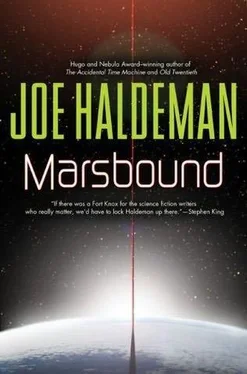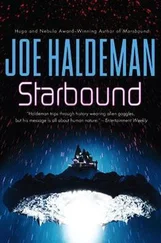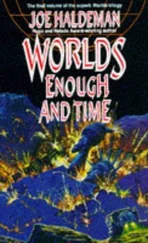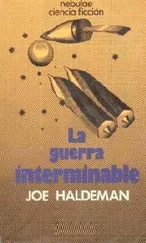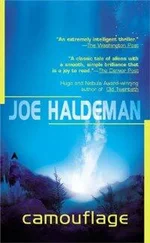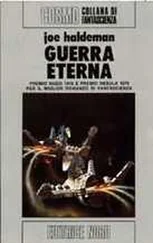Paul Collins, the pilot, looked more handsome without the white war paint. He introduced himself to Card and my parents, proving that he could recognize passengers who weren’t girls.
Before we got to the Space Elevator platform itself, we skirted around a much larger thing, the “light farm,” a huge raft of solar-power cells. They didn’t get power directly from the sun, but rather from an orbiting power station that turned sunlight into microwaves and beamed them down. Then it gets beamed right back up, in a way. The carrier’s electric motors are powered by a big laser sitting on the platform; the laser’s powered by the light farm. There’s another light farm in the Ecuadorian mountains that beams power at the carrier when it’s higher up.
The platform’s like an old-fashioned floating oil rig, the size of an office building. The fragile-looking ribbon that the carrier rides spears straight up from the middle of it. The laser and the carrier take up most of the space, with a few huts and storage buildings here and there. It looked bigger from down on the water than in the aerial pictures we’d seen.
We took an elevator to the Elevator. There was a floating dock moored to the platform. It was all very nautical feeling, ropes creaking as the dock moved with the waves, seagulls squawking, salt tang in the air.
Our boat rose and fell with the dock, but of course the open-air elevator didn’t. It was a big metal cage that seemed to move up and down and sideways in a sort of menacing way as we bobbed with the waves. If you were sure-footed, you could time it right and just step from the dock onto the elevator. Like most people, I played it safe and jumped aboard as the floor fell away.
We all had identical little suitcases made of light titanium, with our ten kilograms of personal items. Twenty-two pounds didn’t sound like very much, but we didn’t have any of the stuff that you would normally pack for a trip, since we couldn’t take clothes or cosmetics. Three people had musical instruments too big to fit in the metal box.
The elevator clanked and growled all the way up. We clattered to a stop and got out onto a metal floor that felt like sandpaper, I guess some stuff to keep you from slipping. There was a guardrail, but I had a stomach flip-flop at the thought of falling back down the way we’d come. A hundred feet? Hitting the water would knock you out, at the very least.
Like we didn’t have enough to worry about; let’s worry about drowning.
To the salt air add a smell of oily grease and ozone tang, like a garage where they work on electric cars—and pizza? I’d have to check that out.
A guy in powder blue coveralls, the uniform of the Space Elevatorcorporation, checked to make sure we were all there and there weren’t any stowaways. We each picked up a fluffy towel and a folded stack of clothes. There was a sign reminding us that the clothes we were wearing would be donated to a local charity. Local? The Society for Naked Fish, I supposed.
I’d just had a shower at the hotel, but no such thing as too clean if you’re going without for a couple of weeks. Or five years, if you mean a real shower.
The women’s shower room only took six at a time, and I didn’t particularly want to shower with Mom, so I left my stuff stacked by the wall and went off to explore, along with Card, who was looking a little more human.
The climber wasn’t open yet, which was okay; we’d be spending plenty of time in it. It was a big white cylinder, about twenty feet in diameter and twenty feet tall, rounded on the top. Not a vast amount of room for forty people. Above it was a robot tug, all ugly machine. It would pull us up a few hundred feet, before the laser took over. It also served as a repair robot, if there was something wrong with the ribbon we were riding on.
“Big foogly laser,” Card marveled, and I suppose it was the biggest I’d ever seen, though truthfully I expected something more impressive, more futuristic. The beam it shot out was more than twenty feet in diameter, I knew, and of course it carried enough power to lift the heavy carrier up out of the Earth’s gravity well. But it was only the size of a big army tank, and in fact it looked sort of military and menacing. I was more impressed by the big shimmering mirror that would bounce the laser beam up to us, to the photocells on the base of the carrier. Very foogly big mirror.
Three other young people joined us, Davina and Elspeth Feldman, sisters from Tel Aviv, and Barry Westling from Orlando, just south of us. Elspeth looked a little older than me; the others were between me and Card, I figured. Barry was a head taller than him, but a real string bean.
Elspeth was kind of large—not fat, but “large-boned,” whatever that really means. You couldn’t help but note that most of us future Martians were on the small side, for obvious reasons. Someone has to pay for every pound that goes to Mars. Mother spelled out the inescapable math—every day, you need twelve calories per pound to stay the same weight: someone who weighs fifty pounds more than you has to pig down everything you eat plus one Big Mac every day. Over the six-month flight, that’s eighty-five extra pounds of food, on top of the extra fifty pounds of person. So small people have a better chance in the lottery.
(They call it a “lottery” to sound democratic, as if every family had an equal chance. If that were true, I wouldn’t have lost a year of Saturdays to the cause.)
Thinking of food made me ask whether anyone had found out where the pizza smell was coming from. No one had, so we embarked on a quest.
The search led, unsurprisingly, to a shed with a machine that dispensed drinks and food, alongside a microwave in which someone had recently burned a slice of pizza. Elspeth produced a credit card and everyone but my brother tried a slice. He didn’t miss much, but we were more after the idea of pizza than the actuality. We didn’t know for sure that there wouldn’t be any pizza on Mars, but it seemed likely.
Barry and Card went off to play catch with a Frisbee while the rest of us sat in the shade. Neither Elspeth nor Davina was born in Israel; their family moved there after the war. Like ours, their parents are both scientists, their father a biologist and mother in nanotech, both of them involved in detoxifying the battlefield after Gehenna. Davina started to cry, describing what they’d had to do, had to see, and Elspeth and I held her until it passed.
Maybe there wouldn’t be pizza on Mars, but there wouldn’t be that, either. What hate can do.
There was no privacy in the shower, and not much water—I mean, all you could see in any direction was water, but I guess the salt would froog up the plumbing. So you had to push a button for thirty seconds of lukewarm unsalted water, then soap up, push the button again, and try to get the soap off in another thirty seconds. Then do it again for your hair, without conditioner. I was glad mine was short. Elspeth was going to have the frizzies for a long time.
She has quite a dramatic figure, narrow waist and big in the hips and breasts. Mother describes me as “boyish,” which I think is Motherspeak for “titless wonder.” Women built like Elspeth are always complaining about their boobs bumping into things. Things like boys, I suppose.
I liked her, though. It could be a little awkward, the first thing you do when you meet somebody is cry together, then strip naked and jump in the shower, but Elspeth was funny and natural about the latter. In the desert kibbutz where she spent summers growing up, they didn’t have individual showers, and the water was rationed almost as severely as here.
Light blue used to be one of my favorite colors, but it does lose some of its charm when everybody in sight is wearing it. We left our “civilian” clothes in the donation box and put on Space Elevator coveralls and slippers. Then we went to the media center for lunch and orientation.
Читать дальше
